
“He Loved To Micromanage”: Worker Teaches Boss A Lesson After Latest Demand Gets Him Fired
InterviewThere are few things more satisfying than putting someone back in their place by doing exactly what they asked; any enthusiast of malicious compliance knows it.
The redditor u/pathofuncertainty sure does, as they dealt with a micromanaging boss by following his orders until he started regretting ever giving them. As per the superior’s request, the OP would call him at unusual hours or provide information in excruciating detail, which likely wasn’t the outcome the boss had expected.
Bored Panda discussed the topic of micromanaging with a behavioral scientist, the originator of Teaming Science, and inventor of the technology measuring team member collaboration, Dr. Janice Presser, who was kind enough to answer a few of our questions. We also got in touch with u/pathofuncertainty, who provided more insight about the situation. You will find both of their thoughts in the text below.
Few employees enjoy being ordered around by a micromanaging boss
Image credits: stockbusters (not the actual photo)
This redditor followed their superior’s orders to the T, led by malicious compliance
Image credits: stockbusters (not the actual photo)
Image credits: pathofuncertainty
The majority of employed people have faced micromanaging at some point in their careers
Employees often have to respond to an entire chain of command or at least a couple of the higher-ups; but sometimes one micromanaging boss is worse than all the other superiors put together. That’s why it’s no surprise that such a management style doesn’t have a lot of fans out there.
“Micromanaging is the best way to let employees know that you don’t trust them, you think they are incompetent, and you expect them to fail,” behavioral scientist and Teaming Science originator Janice Presser told Bored Panda. “In short, it doesn’t work unless you really want to demotivate your team.”
Forbes pointed out that nearly four-in-five employees have experienced micromanagement at some point in their careers, which unsurprisingly had some negative effects: roughly 70% of employees believed it interfered with their job performance and around 85% felt their morale took a hit. To make matters worse, this type of management led to nearly seven-in-ten employed people thinking about changing their jobs and encouraged 36% to do exactly that.
In a recent interview with Bored Panda, the OP revealed that working with such a manager was extremely difficult. “It didn’t matter how well you did on any project. If you messed up at all, regardless of your track record, evaluations, or awards, he still screamed at you or belittled you, so there was never any trust in either direction. We weren’t as effective as we could have been because everyone on our team felt the need to document everything; even if he didn’t demand it.”
One of the things that makes working with a micromanager difficult, according to Janice Presser, is that it puts roadblocks into the workflow of the employee, the team, and the entire company. “In the beginning, you get people questioning themselves, which takes time, energy, and attention away from whatever the work is. Then the work is late getting to the next member of the team, and so on. Sooner or later, everyone figures it out and you get a work slowdown,” she explained. “Micromanaging affects people at different paces, so it’s like pouring glue and sand into gears.”
Image credits: Tima Miroshnichenko (not the actual photo)
Micromanaging often results in detrimental consequences, from lack of trust to employees quitting their jobs
The OP shared with Bored Panda that the reason for their compliance, even if malicious in a way, was lack of a choice in the given situation. “Any deviation from my boss’s direction was met with ridicule, shaming, or disciplinary action,” they pointed out, “so, I didn’t have a choice but to comply. I tried working through managers above him, but for a number of other reasons, their hands were tied and they wouldn’t just allow me to ignore his demands, nor would they tell him to back off or alter his directions.”
The inventor of the technology that measures collaboration between team members, Janice Presser, suggested that not all controlling superiors do it on purpose. “Some micromanagers are often unaware of what they’re doing, so you might try gently stating the obvious: you appreciate the boss’s concern and you’re on it,” she suggested. Pesser continued that if this doesn’t work,—unless you are one of the few people who enjoy being closely managed—it might be best to start looking for another job.
A boss constantly hovering over one’s shoulder or commenting on every little thing they say or do can drive an employee out of their chairs without a doubt; or cause even bigger problems. “Some people are really hurt when they suffer abuse by management, which runs the gamut from micromanaging to worse,” the behavioral scientist told Bored Panda. “If you feel bad in any way—guilty, depressed, or anxious—please get help and figure out how to make a graceful exit. It’s important to make work a safe space, and remember that someone else’s behavior is not in your control; only yours is.”
Image credits: Yan Krukau (not the actual photo)
Fellow redditors shared their views in the comments, the OP replied to some of them
105Kviews
Share on FacebookIt seems like BP has something new every day reinforcing my opinion that the international management surplus is causing the shortage of workers.
It's also these baby bosses who are demanding return to office policies as they KNOW they are unnecessary.
Load More Replies...I had a brilliant boss in my last place, the sort of person that trusts you implicitly and fights in your corner, he did it for all of his team leads and managers. We were being sold to a Chinese company and he left, I'd already started looking and advised my team to do the same knowing our jobs would be replaced with Chinese labour. They replaced him with a guy from another department who had no idea what I did and wanted constant breakdowns of what was going on, to add insult to injury I got a new job at a new place who wanted me immediately but they refused to let me go early and made me work my 3 months notice. That 3 months was essentially spent informing my boss what exactly my department did and how I managed it, the guy they replaced me with was a contractor who spent all his time writing his cryptocurrency blog, he had no interest in doing a handover. Shortly after I left they announced everything was shutting down and moving to China, the CEO left, the CFO left, skeleton crew
Or just complain to the big boss who obviously likes you about the insecure baby boss.
It seems like BP has something new every day reinforcing my opinion that the international management surplus is causing the shortage of workers.
It's also these baby bosses who are demanding return to office policies as they KNOW they are unnecessary.
Load More Replies...I had a brilliant boss in my last place, the sort of person that trusts you implicitly and fights in your corner, he did it for all of his team leads and managers. We were being sold to a Chinese company and he left, I'd already started looking and advised my team to do the same knowing our jobs would be replaced with Chinese labour. They replaced him with a guy from another department who had no idea what I did and wanted constant breakdowns of what was going on, to add insult to injury I got a new job at a new place who wanted me immediately but they refused to let me go early and made me work my 3 months notice. That 3 months was essentially spent informing my boss what exactly my department did and how I managed it, the guy they replaced me with was a contractor who spent all his time writing his cryptocurrency blog, he had no interest in doing a handover. Shortly after I left they announced everything was shutting down and moving to China, the CEO left, the CFO left, skeleton crew
Or just complain to the big boss who obviously likes you about the insecure baby boss.

 Dark Mode
Dark Mode 

 No fees, cancel anytime
No fees, cancel anytime 







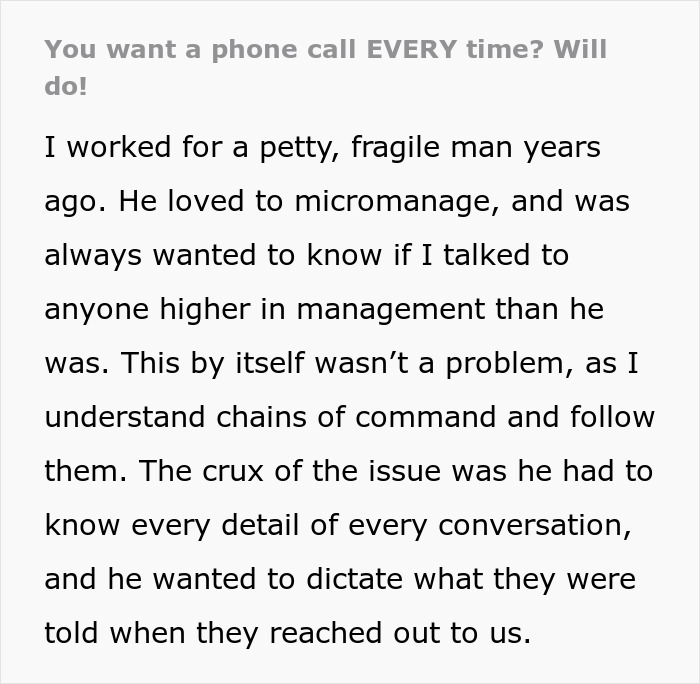
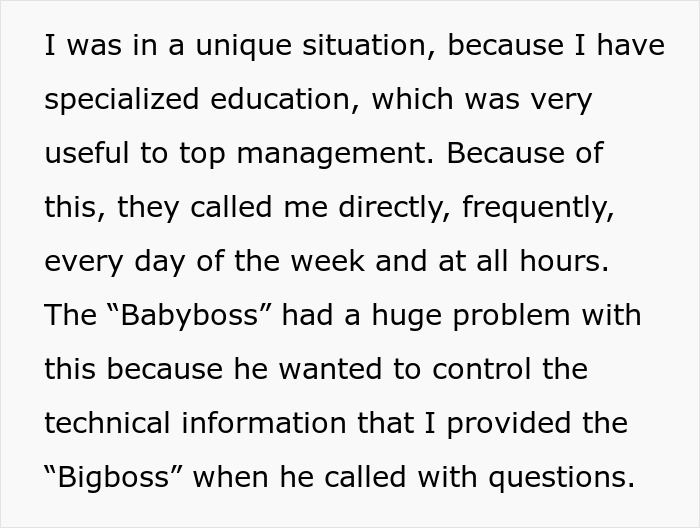





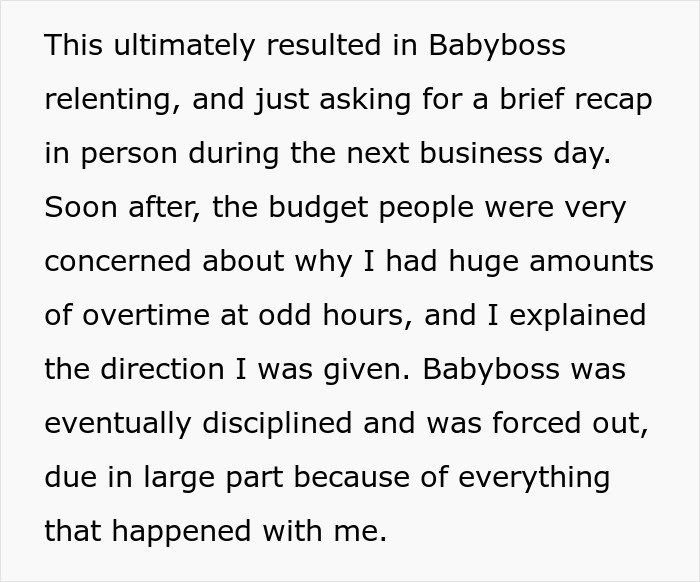


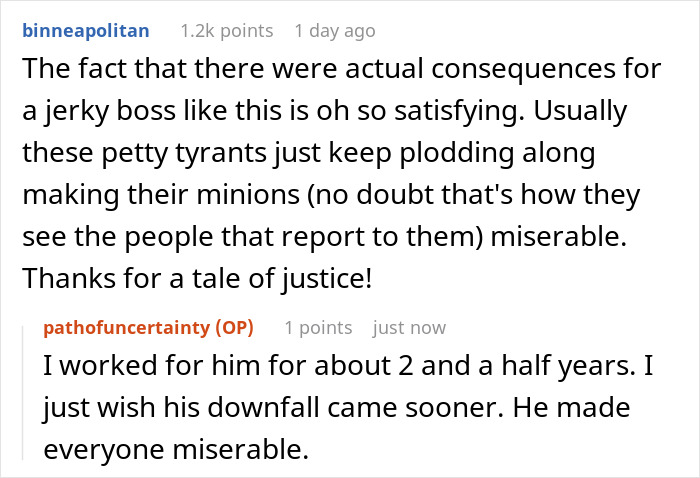

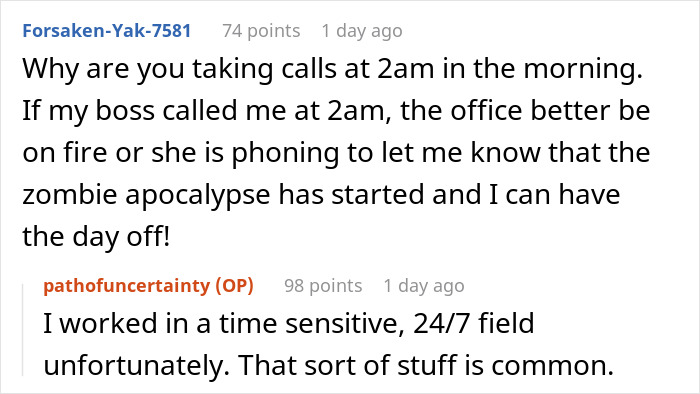
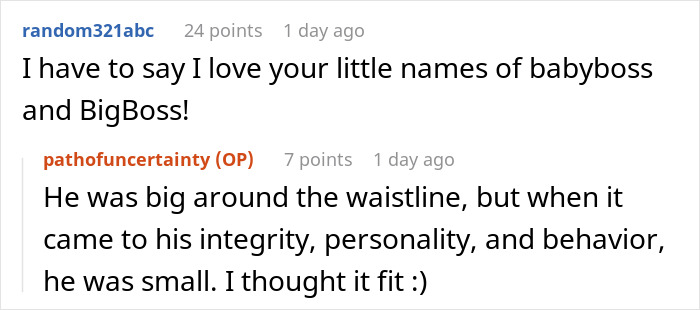
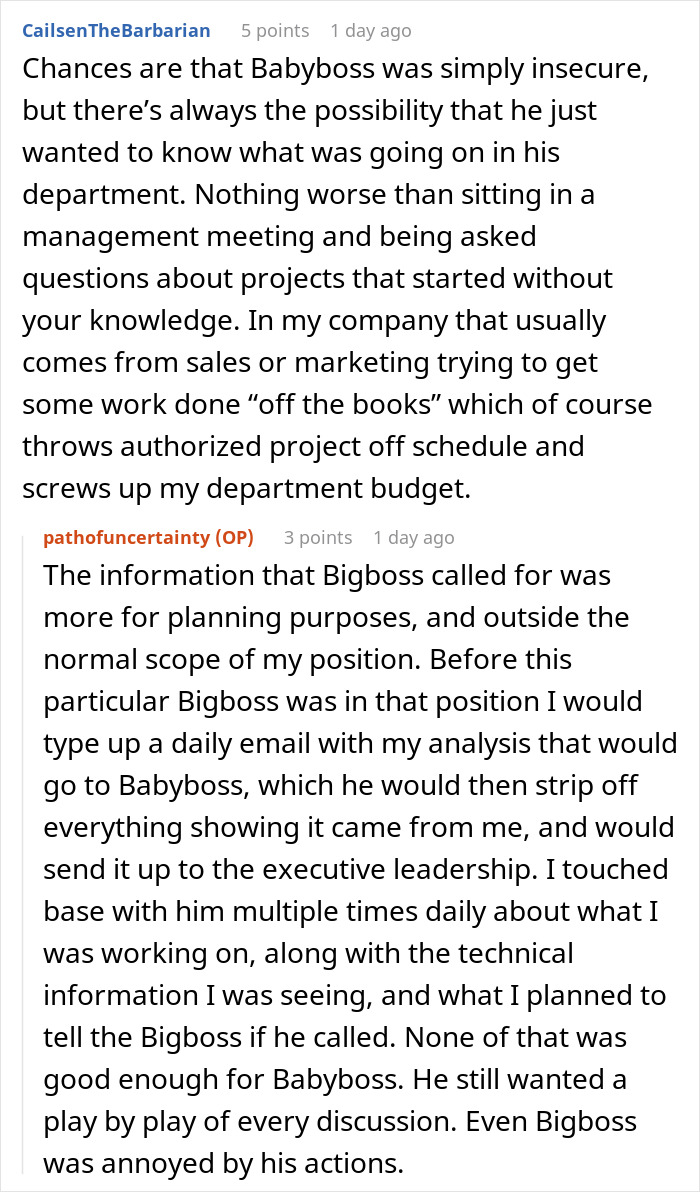




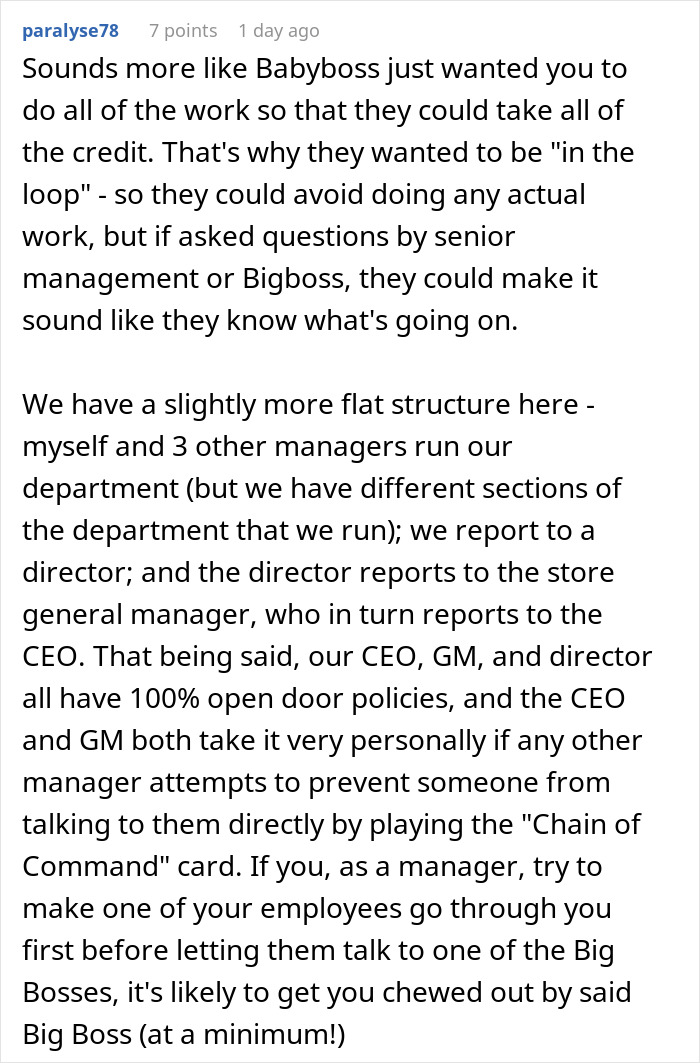
















































69
8